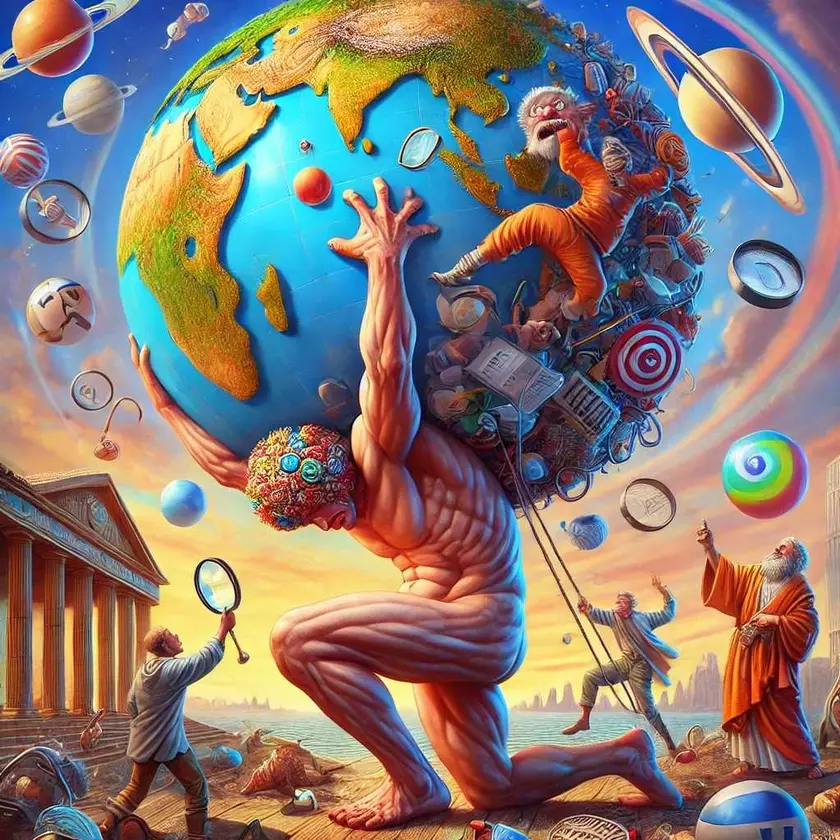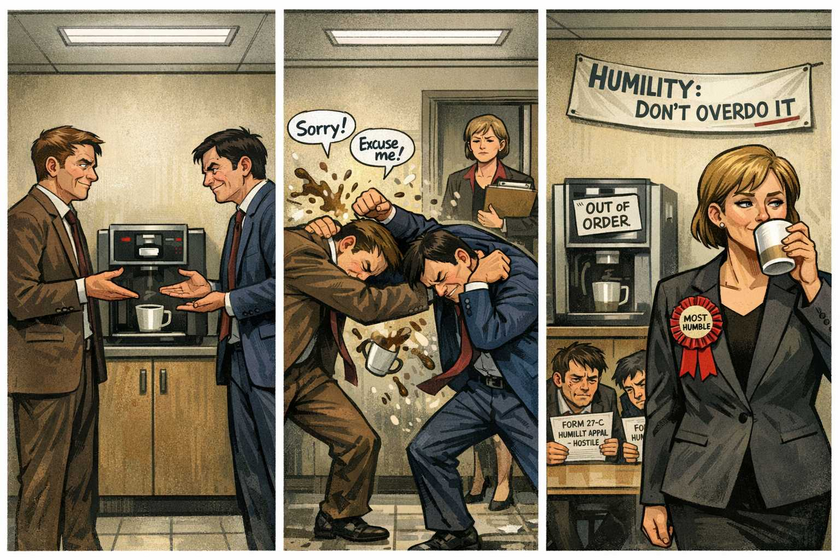Setup: Recognizing the Role of a Cartoonist
"In the Western world, one of the ways to get this detachment is to recognize the peculiar humorous undertone of things. It’s sometimes a little difficult to explain it, but the cartoonist does so and does so very adroitly."
"The use of humor through the cartoon, through the various exaggerations that we see around us, helps us to sense fallacies which are otherwise perhaps unnoticeable."
"Humor therefore does have this basic concept beneath it, that much of it is derived from the inconsistency of human action."
"Humor arises from the fact that the individual is unable to maintain policies in a consistent way over any great period of time. He starts in one direction and immediately loses perspective."
Delivery: Examples of a Cartoonist’s Work
"You take a cartoon such as four or five automobiles parked in a lot. Four of them are magnificent, large, shining cars. The last one is a small, old, rickety car. The caption underneath says, ‘Which one belongs to the President?’ And in your mind, you can immediately decide that it probably is the small, broken-down car, because he is the only one there who does not need to put on airs. He’s the only one who is not trying to get somewhere else."
"Another cartoon: A man is buying an automobile, and the man has insisted he wants it without extras. The salesman says to him, ‘Well, after all, my dear man, you will want the wheels.’ This is a play on the constant loading of cars with unnecessary features."
"Or the man in the car who had driven up on the back of a larger car, between two exaggerated fins, because he thought he was on the San Francisco Bay Bridge. These kinds of things represent our modern laughing at stupidity, which we recognize and accept good-naturedly."
Finishing: The Significance of a Cartoonist’s Work
"This complete security of mind reminds us that these cartoons that appear in our papers every day—many of them—are almost Zen parables."
"With a few words or no words at all, they cut through a division of human life."
"They are wonderful subjects for meditation. Not merely because we want to laugh, although we may do so, but because we see in them an appreciation of the stratification of human consciousness."
"We see how man operates, and we see the world through the eyes of a person who is trained in this kind of rather gentle but pointed criticism."
"If we could take such humor to ourselves, we could very often transform this pressure that burdens us so heavily into a kind of pleasant, easy, humorous relationship with things that might seem very serious."
"Humor does not necessarily mean flippancy. It does not mean that we do not consider things. Humor is often the deepest consideration of all, but it arises from this policy of reducing the human ego—pulling down this personal sense of grandeur, which makes it so hard for us to live with each other."
--------------------------
Humor can indeed be a saving grace. As we watch people with their various problems and troubles, we observe that those who do not have a sense of humor are likely to have a particularly difficult time with this world. We know that life is serious business, but we also know that very few persons can afford to take it with utter seriousness. To do so is to gradually undermine vitality and psychological integration.
Today, we are concerned with psychological problems. We realize that persons who lose a certain orientation become psychologically depressed and develop serious mental symptoms. Usually, a person under psychological stress has lost perspective. He has either closed himself to the world or he has accepted a negative attitude toward those around him.
One of the most common psychological obsessions is this tendency that we have to create a kind of world the way we decide this world should be and then proceed to be brokenhearted when it is not that way. This is a very common practice. We demand of others that they shall fulfill our expectancies, live up to our standards, or see things as we do. If they fail to agree and cooperate, we consider this an affront, a personal injury, a disillusionment, or a cause of discouragement.
If we have this preconception about living, we will always have a tense and difficult life. The best thing for us to do in most of these problems is to expect no more from life or from other persons than we can reasonably demonstrate that we can expect. To demand more than reasonable expectancy is to open ourselves to suffering. No one really wants to suffer, but we find it very convenient sometimes to fall into suffering patterns, particularly those patterns which make us sorry for ourselves.
Look around and see what kind of world you live in. Realize that you are not going to be in it forever, that it existed before you came and got along somehow. A good part of it is existing while you're here without knowing that you exist. And when you're gone, it is still going to exist in some way—maybe not as well off, but it will make it somehow. Thus, we are not tied to a pattern of consequences so intimate that we must feel that, like Atlas, we carry the world on our shoulders. If we manage to carry our own heads on our shoulders, we're doing very well. If we are able to live a consistently useful, creative type of life and maintain a good attitude toward living, we have achieved about as much success as the average person may reasonably expect.
The situation of making problems desperate, feeling that with our small and comparatively insignificant difficulties, the whole world is shaking to its foundation—this feeling that we cannot be happy and never will be happy unless everybody else changes their conduct—such thoughts as these are certain to cause us a great deal of unnecessary difficulty. They will take what otherwise might be a rather pleasant way of life and make it unbearable to ourselves and others.
In religion, we are particularly faced with the problem of humor. Religion is a very serious business, and to most persons, it should not be taken in a flippant way. We quite agree. On the other hand, it is a mistake to permit religious thinking or spiritual inclinations to destroy our rational perspective toward life. We cannot afford to be miserable for religious reasons any more than for any other group of reasons. Religion is supposed to bring us comfort and consolation. For an individual to declare that his religion is a source of consolation and remain forever unconsoled is not good. Religion is supposed to help us solve problems, to bring us some kind of spiritual health, faith, hope, and charity. Very few problems will stand up under faith, hope, and charity.
But most religious persons are not practicing these attitudes. They are still criticizing and condemning, fearing, and worrying—just like everyone else. Out of all this type of realization, we do come to some rather obvious and reasonable conclusions. Among the persons who have come to me in trouble, the overwhelming majority lack a good sense of humor. This report is also found in the records of practically everyone who carries on contact at a counseling or helping level.
The individual has lost the ability to stand to one side and watch himself go by. When he looks around him and sees all kinds of funny people, he forgets that other people are also watching him with the same convictions that he has. If we can manage to keep a certain realization of the foolishness of our own seriousness, we are on the way to a personal victory over problems.
Most persons expect too much of others. They expect more insight than is available, more interest than other people will normally have, and they expect other people to be better than reasonable probabilities. In substance, they expect other people to be better than they are themselves. We all know that we have faults, and we are sorry in a way. But at the same time, we expect other people to endure them. On the other hand, when someone else has the same faults, we resent it bitterly. We cannot accept the very conduct that we impose upon others.
A sense of humor is a characteristic with which some persons are naturally endowed. Some folks seemingly have a knack for observing the whimsical in life. They are born with this gift. But even these have to cultivate it to some degree. Humor, like everything else, will not mature without cultivation. If we allow this humorous streak to merely develop in its own way, it is apt to become satirical or involved in some selfish pattern by which we use it to ridicule others or make life uncomfortable for them.
A sense of humor has to be educated. It has to mature because there is really no good humor in ridiculing other people. This is not funny, and it is not good. It is not kindly. It merely becomes another way of taking revenge upon someone. This kind of vengeance can be defended in various ways, but if our humor takes to fighting in personal form, then it needs reform just as much as any other attitude that we have.
Humor arises from the inconsistency of human action. The entire end of humor seems to be a means of reducing the pompous—to bring down that which appears to be superior or beyond us to the common level. We use it mostly, however, against individuals who have falsely attempted to prove superiority. We seldom, if ever, turn it bitingly against the world’s truly great and noble people. We are more apt to turn it against the egotist, the dictator, or the one who is in some way so obnoxious that we feel the need to cut him down to more moderate proportions.
Most of all, humor makes life more pleasant. There is more sunshine in things. We are not forced to constantly defend something. We can let down, be ourselves, and enjoy the values that we know, free from false pressures. We can also begin to grow better, think more clearly, and unfold our careers more constructively. We can share in the universality of knowledge. We can open ourselves to the observation of the workings of laws around us.
So we strongly recommend that everyone develop and mature a pleasant sense of humor, that we occasionally observe some of the humorous incidents or records around us, and that we take these little humorous episodes and think about them. Because in them, we may find just as much truth as in Scripture. Through understanding these little humorous anecdotes, we shall come to have a much closer and more meaningful relationship with people—a relationship built upon laughing together over the common weaknesses and faults that we all share.
In this way, we are free from many limitations of energy and have much more time at our disposal with which to do good things—happily and well.














